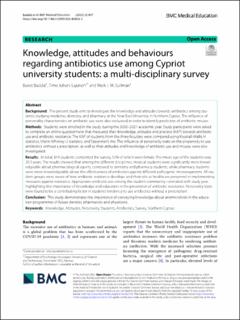| dc.contributor.author | Baddal, Buket | |
| dc.contributor.author | Lajunen, Timo Juhani | |
| dc.contributor.author | Sullman, Mark J. M. | |
| dc.date.accessioned | 2023-02-09T10:05:31Z | |
| dc.date.available | 2023-02-09T10:05:31Z | |
| dc.date.created | 2022-12-28T13:18:16Z | |
| dc.date.issued | 2022 | |
| dc.identifier.citation | BMC Medical Education. 2022, 22 (1), . | en_US |
| dc.identifier.issn | 1472-6920 | |
| dc.identifier.uri | https://hdl.handle.net/11250/3049579 | |
| dc.description.abstract | Background
The present study aims to investigate the knowledge and attitudes towards antibiotics among students studying medicine, dentistry, and pharmacy at the Near East University in Northern Cyprus. The influence of personality characteristics on antibiotic use were also evaluated, in order to identify predictors of antibiotic misuse.
Methods
Students were enrolled in the study during the 2020–2021 academic year. Study participants were asked to complete an online questionnaire that measured their knowledge, attitudes and practice (KAP) towards antibiotic use and antibiotic resistance. The KAP of students from the three faculties were compared using Kruskall-Wallis H statistics, Mann-Whitney U statistics, and Spearman’s rho. The influence of personality traits on the propensity to use antibiotics without a prescription, as well as their attitudes and knowledge of antibiotic use and misuse, were also investigated.
Results
In total, 314 students completed the survey, 52% of which were female. The mean age of the students was 20.5 years. The results showed that among the different disciplines, medical students were significantly more knowledgeable about pharmacological agents, compared to dentistry and pharmacy students, while pharmacy students were more knowledgeable about the effectiveness of antibiotics against different pathogenic microorganisms. All student groups were aware of how antibiotic resistance develops and their role as healthcare personnel in implementing measures against resistance. Appropriate antibiotic use among the student community correlated with study year, highlighting the importance of knowledge and education in the prevention of antibiotic resistance. Personality traits were found to be a contributing factor in students’ tendency to use antibiotics without a prescription.
Conclusion
This study demonstrates the importance of conveying knowledge about antimicrobials in the education programmes of future dentists, pharmacists and physicians. | en_US |
| dc.language.iso | eng | en_US |
| dc.publisher | BioMed Central | en_US |
| dc.rights | Navngivelse 4.0 Internasjonal | * |
| dc.rights.uri | http://creativecommons.org/licenses/by/4.0/deed.no | * |
| dc.title | Knowledge, attitudes and behaviours regarding antibiotics use among Cypriot university students: a multi-disciplinary survey | en_US |
| dc.title.alternative | Knowledge, attitudes and behaviours regarding antibiotics use among Cypriot university students: a multi-disciplinary survey | en_US |
| dc.type | Peer reviewed | en_US |
| dc.type | Journal article | en_US |
| dc.description.version | publishedVersion | en_US |
| dc.source.pagenumber | 11 | en_US |
| dc.source.volume | 22 | en_US |
| dc.source.journal | BMC Medical Education | en_US |
| dc.source.issue | 1 | en_US |
| dc.identifier.doi | 10.1186/s12909-022-03853-2 | |
| dc.identifier.cristin | 2097773 | |
| cristin.ispublished | true | |
| cristin.fulltext | original | |
| cristin.qualitycode | 1 | |

